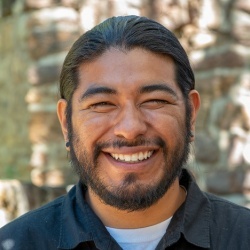He arrived in his distinct silver-grey Hilux truck with zebra stripes, which was almost like his trademark. Benito was tall, wore glasses, usually had his shirt tucked in and carried his morral from Nebaj, which he almost always had with him. At meetings, oftentimes Benito was quiet at first, observing and attentively listening to everyone speaking while he meticulously took notes. Afterwards, he would begin to speak with a knowledge and sense of humor that made everyone in attendance reflect and engage in rich dialogue and debate. He could talk for hours. I remember having long conversations with Benito. And I was always captivated by his deep knowledge and understanding of history, politics and culture. I would travel with him occasionally to communities in his zebra-striped truck. He would offer rides to people walking on the road. Benito was humble, one of the most critical and analytical thinkers you could meet, and committed to supporting indigenous peoples, particularly the Ixil, Q’eqchi and K’iche’.
Benito was murdered inside his zebra-striped Hilux truck in Pacam, San Antonio Ilotenango, Quiché, on the morning of August 10, when he was on his way to visit a community. His death sent shockwaves to those who knew him. There were feelings of disbelief and sadness, but also of anger because of the killing of our friend and compañero. Soon after, multiple organizations, community leaders and government officials, the President of Guatemala and the President of France, Emmanuel Macron, among them, denounced Benito’s murder and demanded the perpetrators of this heinous act are brought to justice. His death follows the recent murders of indigenous leaders and community organizers such as spiritual guide Domingo Choc Che (Q’eqchi’) on June 7, Medardo Alonzo Lucero (Ch’orti’) on June 15 and Fidel López on June 23. Others such as Carlos Enrique Coy (Q’eqchi’) have been disappeared.
[frasepzp1]
Benito was from France and arrived to Guatemala over 20 years ago to support indigenous communities through his work as a member and director of Agronomists and Veterinarians without Borders (AVSF). Benito was known as B’en Ijom in the Ixil Region, where he accompanied the ancestral authorities, contributed to the development of the curriculum of the Ixil University and was cofounder of it; where he also served as a facilitator and member of the council of examiners and helped create farmer’s markets in several communities. He was admired for his commitment and solidarity. Sixteen organizations, the Organizations of Civil Society of the Ixil Maya, issued a declaration where they condemn Benito’s assassination. Their words capture the respect and affection that many had towards him:
“One day after the commemoration of the International Day of the World’s Indigenous Peoples, on August 10, 2020, the murder of B'en Ijom marked again the recent history of the Ixil people, joining the list of our grandmothers, grandfathers and loved ones who, dying in the civil war, have already returned to the other dimension of life, who with their life and blood sealed the struggle towards the respect for human rights and the defense of the territory” (my translation).
A video honoring his life was created to capture his legacy in the Ixil Region.
Benito’s murder and the killings of all of the other human rights defenders, indigenous leaders and environmentalists need to be adequately investigated. These recent murders are a reminder that in Guatemala people are killed simply for defending and promoting social justice, as well as human and indigenous rights. They raise concerns of a Guatemalan State that continues to be a place for rampant impunity for violence and murder, thus creating an environment of fear and intimidation. Benito’s example, spirit and memory will live with us and give us courage to fight for a better tomorrow.
Benito is survived by his compañera de vida (life partner) and his two sons.
* * *
Read it in Spanish.




























Más de este autor